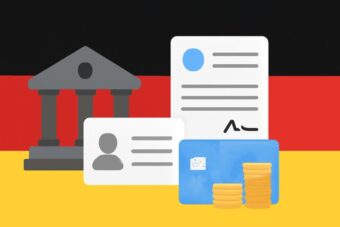How to get a mortgage in Germany as a foreigner — this is one of the most frequent legal queries among expats looking to invest or settle in the country. Germany’s property market is known for its stability and long-term value growth, attracting not only locals but also thousands of foreign buyers each year. While purchasing real estate as a foreign national is legal and feasible, obtaining financing can be complex without understanding the legal and financial prerequisites. This article provides a structured and professional guide on how to secure a mortgage in Germany as a non-citizen, focusing on legal requirements, financial documentation, and expert advice to increase your chances of approval. This is reported by the G.Business website.
Understanding the German Mortgage Market
Germany's mortgage system is conservative, highly regulated, and risk-averse. For foreigners, the criteria tend to be stricter compared to domestic applicants, especially when it comes to financial security and documentation. However, the legal framework does not discriminate based on nationality — rather, the decision rests on the applicant’s financial profile, residence status, and ability to demonstrate long-term stability.
Legal Basis for Foreign Ownership
Foreign nationals have the right to purchase property in Germany with no legal restrictions, whether they reside in Germany or not. However, owning property does not automatically grant residency rights. Mortgages are regulated under the German Civil Code (BGB), which sets the legal foundation for loan agreements, including interest limits and default clauses.
Types of Mortgage Products Available
Foreigners can apply for:
- Annuity loans (Annuitätendarlehen): Fixed monthly repayments with a mix of interest and principal.
- Interest-only loans (Zinszahlungsdarlehen): You only pay interest during the term, principal due at the end.
- Variable rate mortgages (variables Darlehen): Interest tied to the Euribor rate, adjustable at intervals.
These products differ in flexibility, repayment risk, and eligibility — most banks offer a fixed-term annuity loan for foreigners to mitigate risk.
Requirements for Foreigners Applying for a Mortgage
Securing a mortgage in Germany as a foreigner requires not only meeting the general financial criteria but also navigating legal and bureaucratic hurdles. Residency, employment, and banking history are key factors in the bank’s decision-making process.
Residency and Legal Status
German banks are more likely to approve your application if:
- You hold a long-term residence permit (Niederlassungserlaubnis).
- You are an EU/EEA citizen residing in Germany.
- You are married to a German citizen or hold a Blue Card.
Temporary residence holders and non-EU nationals may still qualify but with stricter down payment conditions and higher interest rates.
Employment and Income Verification
You must prove stable income, preferably from employment in Germany or within the EU. Typically, banks require:
- Permanent employment contract (unbefristeter Vertrag).
- Minimum of 6 months employment history.
- Last 3 salary slips.
- Tax declaration or income certificate (Lohnsteuerbescheinigung).
Self-employed individuals face stricter scrutiny and must present at least 2 years of audited accounts.
Financial Documentation and Creditworthiness
Documentation is the backbone of the mortgage application process in Germany. Foreigners must be especially thorough, as banks require official proof of financial responsibility and solvency.
Documents You Will Need
Prepare a full set of documents, including:
- Valid passport or ID.
- Residence permit (if applicable).
- Salary slips or financial statements.
- Tax identification number.
- Credit report from SCHUFA (or equivalent if living abroad).
- Bank statements (6–12 months).
- Proof of assets (e.g., savings, other property).
Credit Scoring and Risk Assessment
Banks assess your creditworthiness through:
- SCHUFA score: The German credit bureau, with a score above 90% considered safe.
- Debt-to-income ratio: Should not exceed 35–40%.
- Down payment: A minimum of 20–30% is expected from foreigners.
- Banking history: Preferably with a German bank.
Good preparation can significantly increase the chances of approval.
Down Payments and Loan-to-Value Ratios
Down payment is a decisive factor in mortgage approval. It reduces the risk for the lender and increases your credibility.
Typical Down Payment Amounts
Most banks require:
- 20–30% of the property’s purchase price from foreigners.
- Additional 10–15% for purchase costs (notary, taxes, fees).
This means you should plan to cover at least 30–45% of the total cost from your own funds.
Loan-to-Value Limitations
LTV ratio (Loan-to-Value) for foreigners is usually capped at:
- 60–80% for non-residents.
- Up to 90% for EU citizens with stable income in Germany.
The higher your down payment, the lower the risk category you are assigned.
Mortgage Application Process Step-by-Step
The mortgage application process may seem intimidating but is actually very structured. Below is the general process most applicants follow in Germany.
Step-by-Step Process
- Assess Your Finances: Review your income, expenses, and credit history.
- Select a Property: Choose a property and secure a purchase agreement.
- Get Pre-Approval: Many banks offer preliminary approval (Finanzierungsbestätigung).
- Prepare Documents: Submit all required documents for assessment.
- Underwriting: Bank performs credit check, property valuation, and risk assessment.
- Loan Approval and Contract: Receive final terms, sign the mortgage agreement.
- Notarization and Transfer: German law requires notarization for property transfers.
- Disbursement: Funds are transferred to the seller after registration.
Estimated Timeline
| Stage | Estimated Duration |
|---|---|
| Financial assessment | 1 week |
| Pre-approval | 1–2 weeks |
| Full approval | 2–3 weeks |
| Notarization & transfer | 1–2 weeks |
| Total process | 5–8 weeks total |
This timeline may vary depending on the bank, buyer profile, and the property location.
Types of Banks and Lenders
Not all banks are willing to work with foreigners. It is important to choose lenders experienced with international clients.
German Banks Open to Foreigners
- Deutsche Bank
- Commerzbank
- HypoVereinsbank (UniCredit)
- Sparkasse (local branches vary)
- ING-DiBa
These institutions usually have English-speaking staff and online platforms for international clients.
Mortgage Brokers and Online Platforms
Using a mortgage broker (Immobilienfinanzierungsvermittler) can help:
- Compare offers across banks.
- Navigate legal requirements.
- Speed up paperwork and communication.
Popular platforms: Interhyp, Dr. Klein, and Hypofriend specialize in expat mortgages.
Legal Fees and Additional Costs
Beyond the down payment, there are various costs associated with purchasing property in Germany. These need to be budgeted separately.
Typical Additional Costs
- Notary fees (1.5%)
- Property transfer tax (Grunderwerbsteuer): 3.5–6.5% depending on the federal state.
- Real estate agent commission: 3–6%
- Registration in the land register (Grundbuch): ~0.5%
In total, these additional costs can amount to 10–15% of the purchase price.
Who Pays What
In most German states:
- Buyer pays all notary and tax costs.
- Seller may split commission in private transactions.
- Mortgage contract registration is borne by the buyer.
Risks and Pitfalls to Avoid
Foreign buyers face specific risks if unaware of German property law and mortgage practices. Awareness and legal consultation are key to avoiding costly mistakes.
Common Issues for Foreign Buyers
- Language barrier in contract terms.
- Inadequate SCHUFA score or credit history.
- High LTV ratios leading to rejection.
- Uninsured property valuation risks.
How to Mitigate Risks
- Work with bilingual real estate agents and notaries.
- Open a German bank account early.
- Request translation of all legal documents.
- Secure pre-approval before committing to a purchase.
Tax Implications and Legal Obligations
Mortgage and property ownership come with tax consequences. It is advisable to consult with a tax advisor (Steuerberater) to stay compliant.
Income Tax and Deductions
If renting out the property:
- Mortgage interest is tax-deductible.
- Maintenance and depreciation costs can also be deducted.
- Rental income must be declared in Germany.
Property Tax and Annual Costs
Property owners must pay:
- Grundsteuer (property tax): Determined by local municipality.
- Building insurance and maintenance costs.
- Loan repayment and interest charges as per mortgage contract.
Getting a mortgage in Germany as a foreigner is a detailed, legally regulated process — but one that is absolutely achievable with the right preparation. Banks do not exclude applicants based on nationality, but they do require thorough documentation, financial proof, and long-term stability. By understanding the process, preparing the necessary paperwork, and possibly working with experienced brokers, foreigners can successfully navigate the mortgage market and become proud property owners in Germany.
Stay connected for news that works — timely, factual, and free from opinion — and insights that matter now: What is a Finanzamt and How to Register for Taxes in Germany


